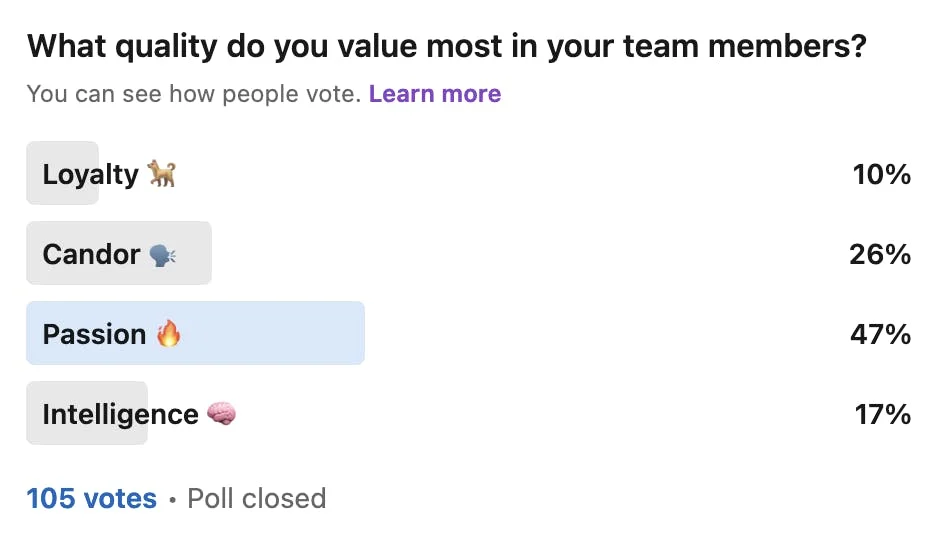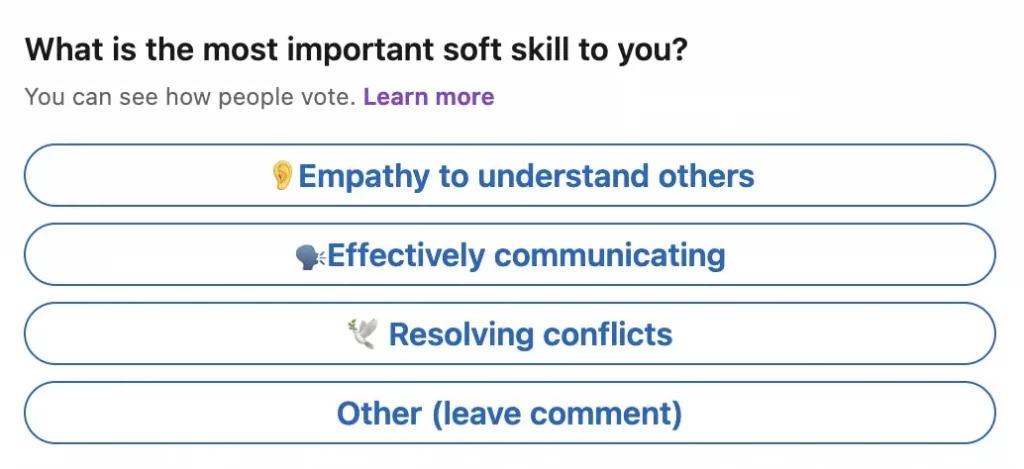Building on last week's topic on integrity, I wanted to share part of a discussion I had with a leader who replied to last week's edition:
The most important aspect of integrity is your example. How you act is what your team sees and reacts to, so you need to get that right first.
But what about your team having integrity?
It comes down to being clear with your team on expectations, and having open discussions when there are issues.
Yet, no matter what your team does, it's really important to remember it's partially your responsibility as the leader.
Yes, hold your team accountable, but you need to hold yourself accountable first, including taking some responsibility for when your team comes up short. It can take awhile to get used to that, but there are *always* things you could have done to avoid problems (i.e.- you could have more closely monitored the situation, assigned the task to a different team member, or been more supportive.)
When you demonstrate integrity in your actions and your accountability, you may be surprised how your team acts in response.
In today’s edition, we cover the value of meaning in your work, a new book of the month on the ever-important topic of stress, and revisit a classic Lighthouse blog post for skeptical leaders.
Let’s dive in…
Table of contents:
- 🥘 Food for Thought on the Largest Factor in Workplace Happiness
- 📚 Book of the Month on Changing How You View Stress
- 💡 Did you Know on How to Grow a Group of Your Managers
- 📖 Your Leadership Long Read on 10 Disadvantages of 1 on 1s
- ❓ Poll of the Week on the Most Important Soft Skill
➡️ Did a friend forward this to you? Get every issue straight to your inbox by signing up here.
Note: This is a preview of our weekly leadership newsletter, Lighthouse Leadership Weekly (LLW).
To get this sent to your inbox every week, along with our latest long form essays on this blog, you can sign up here.

🥘 Food for Thought
"Unless the manager is bad - in which case that dominates - in my experience this is usually the largest factor in happiness, even more than compensation." - Marty Cagan in his book, Empowered: Ordinary People, Extraordinary Results
As I've continued reading Marty Cagan's product leadership book, Empowered, I was reminded of this important lesson.
Now, you're probably wondering what this magical, largest factor is that can help make you and your team happy.
And it's something so simple, but so easily overlooked: Meaning.
Meaning matters.
Your work has to matter. You need to feel like there is a positive purpose to what you get up every morning to do.
Yet, too often this is overlooked. As Cagan went on to write:
"But it's not always clear to the product person how or why her work is meaningful, or how her one small team contributes in a meaningful way. So it's important to very clearly and explicitly discuss this and reinforce this frequently, both publicly and privately."
He was speaking about product managers, but I think this is true of just about every role at every company.
I've yet to meet a company that talks about meaning too much.
Marty is in good company.
Cagan is not alone in believing in the value of making the meaning of someone's work very clear to them.
As Satya Nadella, CEO of Microsoft, says, “Technologies will come and go, so you need to be able to both ask and answer the question: What do you do as a company, why do you exist?”
Meaning for every person in your company and on your team comes downstream from your company's "why" for existing.
And it's your job as a manager to explain to each of your team members how they contribute to that mission and meaning.
But this isn't about charity. This shouldn't feel like a chore for you, because when you do this, it leads to better performance!
In a study of workers at a call center:
"[Call center employees that] read stories from the beneficiaries of the fundraising organization, who described how the scholarships they obtained from the organization had a positive impact on their lives... earned more than twice the number of weekly pledges (from an average of 9 to an average of 23) and more than twice the amount of weekly donation money (from an average of $1,288 to an average of $3,130).”
If explaining meaning and purpose to call center employees can lead to 2-3X improvements, imagine what you'd see with your team!
Easy, day-to-day ways to help your team understand the meaning behind their work
Knowing that meaning is so important, let's talk about how you can make sure your team understands and feels the meaning in their work.
Try to practice a couple of these this week and watch how your team responds:
1) Share relevant customer stories.
One of the easiest ways to share meaning is to tell your team what you hear from a customer when they make a difference. You can do this individually when it's one person's actions that mattered most, or you can tell your whole team in a group meeting or group chat.
Just remember for the latter you still need to break down how individuals on your team impacted the customer. It's very likely everyone had different parts to play and you should never assume it's self-evident.
2) Talk about meaning and purpose in their 1 on 1s.
To really hit home on the personal side of this, your 1 on 1s with your team members are a great time to remind them of their meaning and purpose. It gives you a private time to really go deep and see both what they think their purpose is, and share multiple stories and reasons their work has meaning. (Get more detail and ideas here)
3) When big projects ship, recognize your team AND talk about the meaning
Big efforts are the most important time to remind people of the meaning of their work. That's when people can feel drained and exhausted, and then throw their hands up thinking, "What's the point?"
You can prevent that by making sure that when you ship big projects you take time to talk about it.
Share your gratitude with your team so they know you see how hard they worked. Then, really make an impression by also talking about why each person's work specifically mattered.
Did that new feature save a key customer? Did their quick communication keep you on schedule? Did they solve a really important problem? Tell them!
4) Make it a recurring ritual for you and your team.
Remembering to do all the things we talk about in this newsletter can feel exhausting. How does anyone remember to do it all?
The answer is simple: Make it a habit.
And one of the simplest ways to make sure you regularly talk about meaning and purpose is to put it as an agenda item every time you have a team meeting of your choosing. That's how you end up compounding 5 minutes in a weekly meeting into over 4 hours of meaning-centered discussions a year from those agenda items alone.
At first, it may be hard to come up with new things every week, but remember that repetition is your friend. You'll get better at it over time as you build the habit, and you may be surprised how much your team enjoys hearing about why their work matters.
5) Create a group chat channel to share meaningful moments
Whether you're in Slack, Microsoft Teams, or another tool, this simple tactic can work wonders. All you have to do is create a special channel for wins, shout outs, and meaning.
Then, start posting meaningful moments that reinforce you and your team's purpose. Make sure to provide enough detail so it's obvious and clear what you're referring to, while not writing a novel no one will read.
Once you post a few, encourage the team to start sharing them, too.
This is how you build a virtuous cycle of your team praising and thanking each other, and reinforcing the meaning and purpose behind the work they do.
And all you have to do is get it started and then nudge it along.
---
Meaning and purpose are things we all know help you feel better about work, but it's easy to forget to get around to talking about it.
That's why we've called this out in various ways across a few editions of the newsletter.
Will you take a few minutes this week to put one of these into practice, so your team can perform at a higher level and love their work more?
📚 Book of the Month on Changing How You View Stress
Stress is bad, right?
Not quite.
When I read Dr. Kelly McGonigal's book, The Upside of Stress, I was amazed to finally see a mystery answered: Why do some people thrive under pressure and others struggle?

It turns out, it's all in your head. Really.
*You* decide if stress is good or bad.
In Dr. McGonigal's research, she found that depending on how you think about stress, your body will react differently; your body will literally release *different chemicals* which help or hurt your body.
Want an example? Think about a pro sport you like or are familiar with.
Now imagine two players in a key moment in the game:
- When the player is thriving under stress, how do they look? Calm, cool, relaxed, focused.
- When the player is "choking" under stress, how do they look? Tense, uptight, worried, jittery.
I saw this last weekend with my favorite team, the Pittsburgh Steelers:
Justin Fields with the slip n slide……..and a fumble. #Colts lead the #Steelers 10-17#NFL
— BenJarmin Munguia (@JustJarmin) September 29, 2024
pic.twitter.com/WcJo5BfQi3
Justin Fields is absolutely struggling in key moments, like this one where he panics out of the snap, runs backwards 15+ yards, and then fumbles. 🤦♂️
This is "choking" under stress.
You can change your stress response.
These differing reactions to stress are exactly because of the different chemicals in your body. You can be under the same stress: game on the line, crowd cheering or silent, no time left, etc, and handle it completely differently.
In either case, it depends on your relationship with stress.
And best of all, that means you have the power to change this.
All you need to do is work on your mindset heading into the stress.
"But Jason, that sounds too easy. It can't be THAT easy."
Well, actually, in one of the experiments shared in the book, a simple phrase reinforcing that everyone taking a test was a "good test taker" improved exam scores for all participants.
Whether you want to increase your poise and performance or help one of your children struggling with it, this is the book for you.
Pick up your copy of The Upside of Stress here.
💡 Did you Know...on Group Edition Training Options
Have you been meaning to train your team of managers to be better leaders?
Do you keep forgetting to make some time to do some mentoring and coaching of your managers?
If that's you, then our Lighthouse Lessons programs are perfect to help you.
We handle all of the prep, structure, and curriculum. All you have to do is pick the program and show up.
What do you want your managers to learn?
What is the most important thing you want your managers to learn? There's probably a Lighthouse Lessons program for that:
- Want your managers to start being better coaches? The Coach's Clinic program teaches them how to give praise that motivates and feedback that drives great performance.
- Need to introduce new managers to the fundamentals of leadership? The Mindset of Great Managers teaches them the fundamental building blocks of servant leadership step by step.
- Wish your managers all had 1 on 1s that went as well as yours? The 1 on 1 Master Class teaches them all our secrets and insights we've learned about 1 on 1s for the past decade + of Lighthouse.
And those are just our 3 most popular programs. We have 8 great programs you can learn more about here.
Or you can learn more about our many programs, discover how group training works, and sign up to get help picking the perfect program for you by going to https://grouplessons.getlighthouse.com/
Best of all, when you purchase a program for your group, you're helping support this newsletter, so we can continue delivering these weekly insights to tens of thousands of leaders like you.
Learn more and sign up your group now here.
📖 Your Leadership Long Read on Disadvantages of 1 on 1 Meetings
We try to focus our blog posts on positive angles and teach you how to do things. However, sometimes it's helpful to look at the downsides of things.
And if you've followed any leadership discussions for long, you know there are some people who hate 1 on 1s. They're proud of not having them and think they're a waste.
And it turns out, in some ways they have a point.
That's why this week's post is an update of one of our classic posts on the subject. This covers 10 common misconceptions about 1 on 1s, and what to do about them so you don't have to deal with these disadvantages.
Because often, it's how you're running your 1 on 1s that causes you and your team to think they're a waste.
Learn the Disadvantages of (poorly run) 1 on 1 Meetings and what to do about it here.
❓ Poll of the week
Last week we asked you what you value most in your team:

First of all, I'm excited to see us cross into triple digits for responses. It's always nice to have a more representative group of responses, and that there is genuine interest in some of the questions we ask.
Thank you to everyone who participated!
Second, it's interesting to see the results, where passion was the clear winner; if you don't have passion for your job, it's hard to do it well, no matter how smart, hard-working, or good a worker you are. I can see many of you felt that way.
Yet, it's also interesting to see that Candor took a solid 2nd place. Having team members who can tell it like it is can be priceless to avoid costly mistakes and have real, open, creative discussions to solve problems. However, many leaders are afraid of such discussions. They don't like rocking the boat, so it's great to see many respondents clearly value having their people speak up.
And finally, as we run these open polls each week, I recognize I have a big audience to ask questions like this and some of you do not, so if you ever have a question you'd like to propose for a future poll, reply and let me know!
----
Now, this week, I wanted to take a look at how you and other leaders value soft skills:

So what do you value most? You can join this survey and see the results here.
Sign up to get this newsletter & our latest blog posts straight to your inbox:




